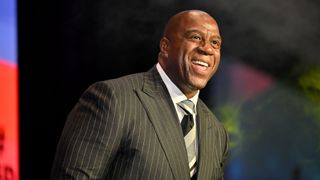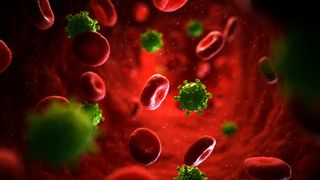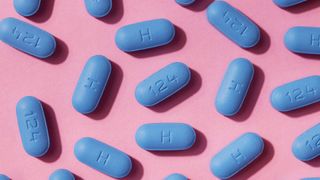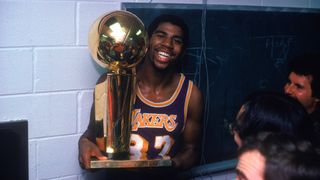How has Magic Johnson survived with HIV?
An epidemiologist explains how Magic Johnson has survived HIV.

How has Magic Johnson survived with HIV? When the former professional basketball player was diagnosed with human immunodeficiency virus in 1991, a lack of understanding and stigmatization surrounding the virus led to questions being raised over his future life prospects. However, thanks to advancements in antiretroviral drugs and management of the condition, the 63-year-old continues to thrive in his roles as a sports analyst, businessman and HIV activist more than 30 years later.
On Nov. 8, 1991, the day after the Los Angeles Lakers star announced he had been diagnosed with the virus, Mark Heisler of the Los Angeles Times wrote: "Many people [diagnosed] with HIV live many years with few serious effects on their health. The average period between infection with the human immunodeficiency virus and diagnosis of […] AIDS is now ten years, according to experts.”
At the time, HIV/AIDS was widely associated with death at a young age, so for many people this outcome might have seemed impossible. But today, thanks to advancements in antiretroviral drugs, the life expectancy of a young person diagnosed with HIV is not dissimilar from that of a similarly aged person without HIV, according to Healthline. It is precisely these kinds of drugs that have helped Magic Johnson manage the disease and have made HIV a chronic health condition rather than a fatal disease.
"There is nothing unique about Magic," Spencer Lieb, senior epidemiologist and HIV/AIDS research coordinator for the Florida Consortium for HIV/AIDS Research told Live Science. "There are still people alive and kicking and doing very well 20 and 30 years after infection."

Spencer Lieb is a HIV/AIDS research coordinator with The AIDS Institute. He is responsible for directing the statewide Florida HIV/AIDS Research Consortium, whose HIV researchers have been responsible for more than 400 scientific studies. Before this, he worked as a senior epidemiologist with the Bureau of HIV/AIDS at the Florida Department of Health.
Lieb said that in the state of Florida alone, hundreds of patients have lived full lives since being diagnosed with HIV in the early 1980s, when the first confirmed AIDS cases were confirmed in the United States. But while Johnson and many others are able to manage their condition, many others are not as fortunate. According to research and estimates by the Centers for Disease Control and Prevention, as of 2019 about 1.18 million Americans have HIV, and 13 percent of them are undiagnosed. Approximately 36,000 people are diagnosed with HIV each year, and more than 15,000 die annually, although these deaths can be from any cause, not necessarily from an AIDS-related illness.
Managing HIV

Despite new advances in medical science HIV remains incurable thanks to "the presence of a latent viral reservoir. During the life cycle of the virus, HIV integrates into the host DNA. A subset of integrated HIV provirus remains transcriptionally silent, producing neither viral proteins nor viral progeny, until reactivation by various physiologic stimuli. This latency of HIV allows some infected cells to escape immune detection and elimination, and these latently infected cells constitute the viral reservoir," wrote Nathan W. Cummins, MD and Andrew D. Badley, MD for Mayo Clinic Proceedings in 2015.
The key with Johnson and others has been preventing their incurable disease from progressing into AIDS.
Upon infection with HIV, a person's immune system kills off nearly all of the virus and infected cells. But some small number remain, and over time, those HIV cells replicate, attacking the immune system in seven stages, according to the National Institute of Health's HIV info page. This is a gradual process known as the HIV life cycle and it is by blocking the virus at each stage of this process that it can be prevented from advancing to AIDS.
Researchers have developed a number of powerful drugs to help people like Johnson block and contain the virus. The key weapon in the beginning was a regimen of three or four antiretroviral drugs, collectively known as antiretroviral therapy, or ART.
"They told me that the three-drug combination was going to save my life, and they were right," Johnson told The Guardian in 2021. "As we talk today, right now, I'm thinking, 'Wow' – it’s been 30 years and I'm still here, healthy. Everything has gone right. There was one drug then, now we have 30-something drugs."
One of Johnson's doctors who helped pioneer the treatment placed him on the then-experimental drug cocktail in 1994, about a year and a half before it came into widespread use in 1996, according to the Daily Beast.
"Magic got a jumpstart on experimental drugs before they were released to the general public," Lieb told Life's Little Mysteries, "but there were many people in clinical trials benefitting at the same time."
HIV medicines
HIV spreads by hijacking a subset of white blood cells called CD4 cells or T cells, which are the body's first line of defense against foreign invaders, and using the cells' DNA to make copies of itself or replicate; in this process, these T cells get destroyed, according to Healthline. The most common drugs in the ART regimen target two of the enzymes that HIV uses to replicate itself.
The first enzyme, called reverse transcriptase, turns the virus' genetic instructions encoded in a single RNA strand into double-stranded DNA. In scientific terms, this mode of replication classifies HIV as a retrovirus, hence "antiretroviral" drugs.
The second enzyme, known as protease, creates new, functional HIV particles by cutting up the proteins produced by our hijacked cellular machinery.
Medication can disrupt these processes, and to that end, Johnson is currently taking reverse transcriptase inhibitor and protease inhibitor drugs, which are contained in the pharmaceuticals Trizivir and Kaletra, respectively, according to the Daily Beast.
These and other HIV-fighting drugs are "hideously expensive," said Lieb. "High ART costs are among many structural barriers that lead to poor treatment access and adherence, contributing to suboptimal HIV outcomes in the United States," according to a report published by JAMA Internal Medicine in 2020.
Public and private medical insurance, as well as various assistance programs, make the medicines more affordable and available to the vast majority of patients in the United States and other parts of the world. It is a "myth," said Lieb, that Johnson, who is wealthy, is buying himself special treatments.
Living with HIV

By taking the right regimen every day, most people living with HIV can see the number of virus particles in a sample of their blood, or viral load, become undetectably low.
Not only does a low viral count stave off symptoms of HIV and AIDS, but it also slashes the odds of a randomly mutated copy of the virus emerging that can prove resistant to the therapy. Furthermore, a low viral load severely reduces the risk of transmitting the virus to others.
Yet even without modern drugs, in rare instances a person living with HIV can manage on their own to keep AIDS at bay. These "long-term nonprogressors" or "elite controllers," estimated at as few as one in 500, have lived for decades with HIV, despite not being on antiretroviral therapy.
It is not known if Johnson is among this "scarce breed," as Lieb called them, but more than likely "without medications, he'd be progressing."
Researchers continue to study long-term nonprogressors to get insights on HIV resistance that could help the 37.7 million people battling the virus, the current estimate of UNAIDS according to HIV.gov.
Public perception of HIV

One of the most important contributions Johnson has made to people with HIV is making people more aware and understanding of the virus. Johnson announced his retirement from the NBA and made his diagnosis public very quickly and then opened up about his experience.
"My ignorance could cost me my life, but I wanted to try and ensure that no one else would become infected with HIV for the same reason" Johnson wrote in Sports Illustrated on November 18, 1991.
"I said that because I had tested HIV-positive, I was retiring from the NBA. I also said that I was going to become a spokesperson in the fight against the human immunodeficiency virus and an advocate for practicing safe sex by using condoms. I also said I was going to beat the disease. And I will," Johnson wrote.
He lived up to that promise by making regular appearances, giving interviews and being an activist for HIV and AIDS organisations. "Johnson went on to attack the HIV stigma with the same passion he displayed on the court, launching the Magic Johnson Foundation to raise awareness about the virus, then pushing Congress and the White House to spend money to fight the disease," wrote Nelson Oliveira for CBS News.
His approach acted as a "public-health catalyst," wrote Alexander Cardazzi, Joshua C. Martin, and Zachary Rodriguez in their 2021 paper "Information Avoidance and Celebrity Exposure: The Effect of "Magic" Johnson on AIDS Diagnoses and Mortality in the U.S." for West Virginia University, as they attempted to quantify the impact his announcement in 1991 had on heterosexual men getting tested for HIV.
Originally published on Live Science on 04 March 2022 and updated on 24 August 2022.
Additional resources and reading
HIV and AIDS are not the only conditions we're still looking to cure. You can also learn about some of the cancers we're still battling and why they're so challenging.
Mental health continues to be a field that we hope to understand and appreciate more. Find out why exercise can be important to mental health too.
Bibliography
- "Magic Johnson’s Career Ended by HIV-Positive Test" by Mark Heisler Los Angeles Times
- "Facts About HIV: Life Expectancy and Long-Term Outlook" Healthline
- "New HIV Diagnoses and People with Diagnosed HIV in the US and Dependent Areas by Area of Residence, 2019" Centers for Disease Control and Prevention
- "Can HIV Be Cured and Should We Try?" Mayo Clinic Proceedings
- "The HIV Life Cycle" National Institute of Health
- "Magic Johnson: the NBA superstar who smashed HIV stigma – then built a huge fortune" by Oliver Laughland The Guardian
- "HIV: Guide to Protease Inhibitors" Healthline
- "HIV Antiretroviral Therapy Costs in the United States, 2012-2018" JAMA Internal Medicine
- "The Global HIV/AIDS Epidemic" HIV.gov
- "I'll Deal With It: HIV Has Forced Me To Retire, But I'll Still Enjoy Life As I Speak Out About Safe Sex," by Magic Johnson, Sports Illustrated
- "Magic Johnson opens up about his health, career 30 years after HIV diagnosis: 'You just sit there and say, what does this mean? Am I gonna die?'" CBS News
- "Information Avoidance and Celebrity Exposure: The Effect of "Magic" Johnson on AIDS Diagnoses and Mortality in the U.S." by Alexander Cardazzi, Joshua C. Martin, and Zachary Rodriguez (West Virginia University, 2021)
- "Why Language Matters: Facing HIV Stigma in Our Own Words" The Well Project
Sign up for the Live Science daily newsletter now
Get the world’s most fascinating discoveries delivered straight to your inbox.